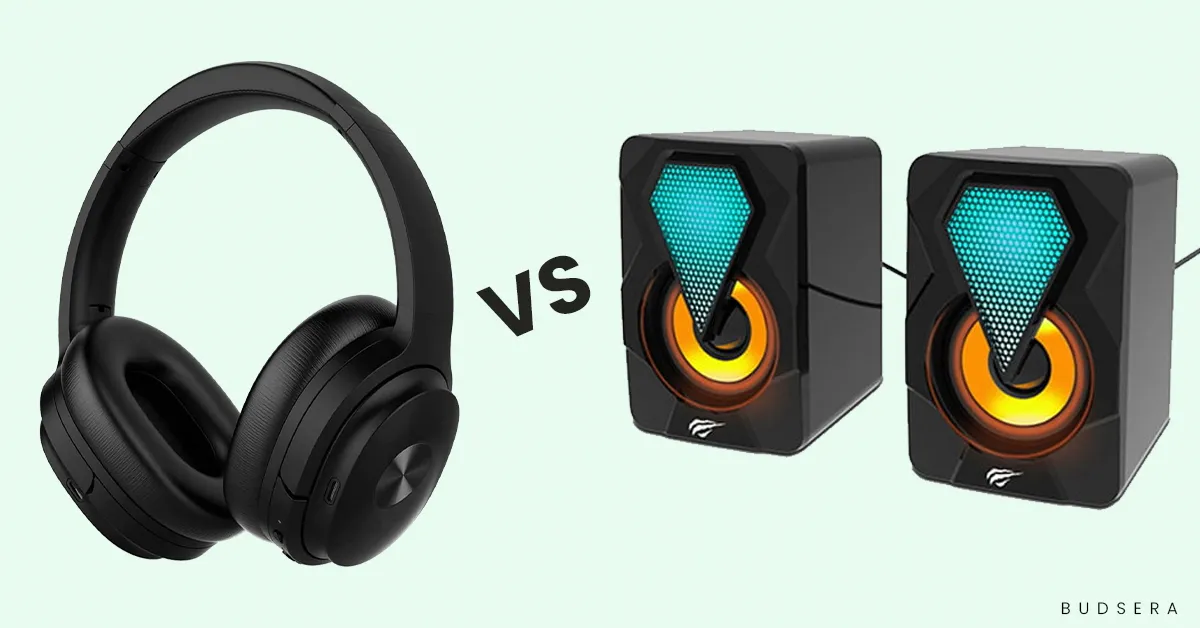Have you ever wondered if your headphones can deliver sound quality that rivals your home stereo speakers? You’re not alone. Audiophiles and casual music fans alike debate which listening device reigns supreme. While headphones and speakers are designed for different experiences – privacy vs shared listening – improvements in tech have made high-quality options accessible for both.
Yet there are still some differences in how headphones and speakers reproduce sound that comes down to physics. Before you drop a bundle on new audio gear, it’s worth understanding how they differ in frequency response, soundstage, and power handling so you can choose what’s right for your needs.
Get ready to go behind the music and find out who comes out on top in the battle of headphone vs speaker sound quality.
How Headphones and Speakers Produce Sound
Headphones and speakers both play your favorite tunes, but how they produce sound is quite different. With headphones, audio is sent directly into your ears. Speakers, on the other hand, fill the surrounding area with sound.
Headphones typically have small drivers, the parts that actually make the sound. They sit right on or in your ears, so they don’t require a lot of power to sound. Speakers usually have much larger drivers that actually move air to create sound waves. They often need an amplifier to boost the signal so you can hear it across the room.
Some headphones, especially in-ear models, provide an “in your head” listening experience. The sound seems like it’s coming from inside your skull. Speakers create an open, expansive sound as the audio travels through the air. Many people find this provides a more natural listening feel.
Of course, audio quality depends on more than just how the sound is produced. The components used, like the magnets and diaphragms in the drivers, make a big difference. While high-end headphones and speakers can both provide amazing sound, in general, speakers have an edge when it comes to producing a wide, open soundstage and visceral bass you can feel in your chest.
That said, headphones win on portability and often cost. You can get a pair of great-sounding headphones for a couple hundred bucks, while high-quality speakers usually start at $500 or more. So what it comes down to is where and how you most enjoy listening to your music. Both options can sound fantastic, so choose what suits your needs.

Side By Side Comparison of Headphones and Speakers
| Aspect | Headphones | Speakers |
|---|---|---|
| Privacy | Provide privacy and noise cancellation | Sound is projected into the room |
| Portability | Portable and convenient for personal use on-the-go | Less portable, generally stationary |
| Isolation | Isolate the listener from the surrounding environment | Allow ambient noise to be heard |
| Social Interaction | Can be perceived as anti-social | Encourage shared listening experiences |
| Wireless Limitations | May have limitations in wireless range and connectivity | More freedom of movement and no wireless range restrictions |
| Comfort | Some discomfort with extended use and weight | Room to move and perform tasks without headphones |
| Immersion and Realism | Limited ability to create a realistic “in-the-room” feel | Can provide a multi-dimensional, room-filling sound |
| Accuracy and Sound Quality | Can be engineered for high accuracy and precise sound | Potential for room interaction and sound coloration |
| Volume and Hearing Safety | Can be dangerous if listened to at high volumes | Room-filling sound can be enjoyed at lower, safer volumes |
| Physical Sensation | Lacks physical vibrations and sensation of sound | Provides a tangible, vibrating bass and room-filling sound |
Key Differences in Headphone vs. Speaker Sound
Headphones and speakers both have their pros and cons when it comes to sound quality. Let’s look at some of the key differences to help determine a winner.
Portability
Headphones win in this category, hands down. You can take headphones anywhere without disturbing others or needing a power source. Speakers, on the other hand, are designed to stay in one place. So if portability matters, headphones are the obvious choice.
Bass Response
Speakers typically provide better bass response, especially subwoofers designed specifically for low-end frequencies. While some high-end headphones do have powerful bass, most consumer models can’t match the bass of a dedicated speaker system. For electronic, hip hop or action-packed soundtracks, speakers often sound more dynamic.
Soundstage
A wider, more spacious soundstage makes music sound like a live performance. Here, speakers have the advantage since they aren’t confined to your headspace. An optimal speaker placement in a room can create an expansive, immersive soundstage that most headphones can’t replicate.
Noise Isolation
Need to block out ambient noise? Headphones win again. Whether in-ear, on-ear or over-ear, headphones are designed to isolate the listener from outside sounds. Speakers, on the other hand, provide little to no noise isolation since the sound is dissipated into the surrounding environment.
In the end, both headphones and speakers are capable of exceptional sound quality for music and more. What’s most important is choosing what fits your priorities and needs. Either way, you can’t go wrong.
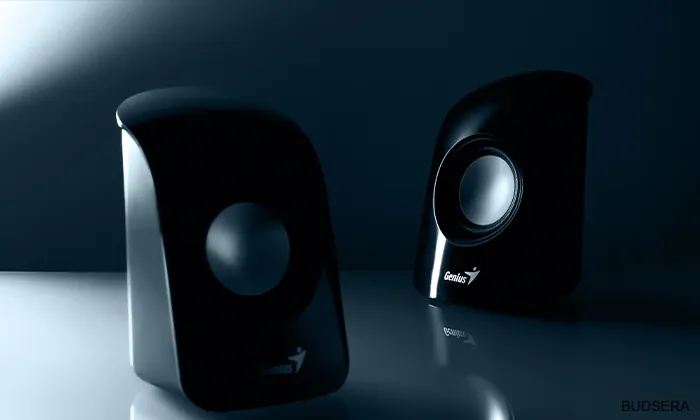
Factors Affecting Headphone Sound Quality
The quality of sound that comes out of your headphones depends on several key factors. Some you can control, and some are simply limitations of the headphone technology itself.
Driver size
The driver refers to the actual speaker inside the headphone that produces the sound. Generally, the larger the driver, the better the sound quality, especially improved bass response. Most over-ear headphones will have a driver size of 40mm or more, while earbuds typically max out at about 15mm. If sound quality is your top priority, look for over-ear headphones with a driver size of 50mm or larger.
Wired vs Wireless
Wireless headphones offer the convenience of no cords, but wired headphones typically provide better sound quality. Bluetooth wireless compression can degrade the audio signal, resulting in reduced quality. If you want the best possible sound, wired is still the way to go. Of course, modern Bluetooth codecs and other technologies are helping to close this gap.
Noise Cancelation
Active noise cancelation uses built-in microphones to detect ambient noise around you and produce inverse sound waves to block it out. This can negatively impact sound quality slightly in some cases. If you don’t need noise cancelation, you may get marginally better pure audio quality from headphones without it.
Frequency Range
The wider the frequency range, the more accurately headphones can reproduce all the high, mid and low tones in music for a full, rich sound. Look for headphones that advertise a frequency range of at least 20 to 20,000 Hz, which covers the full spectrum of human hearing. Some high-end models go even wider, from 5 to 40,000 Hz.
While headphones will never match the absolute power and openness of a good speaker system, by paying attention to these key factors you can find a pair that gets you remarkably close to that experience. The technology and options available today mean you can have sound quality that may even surpass your expectations.
When Headphones Can Outperform Speakers
When it comes to sound quality, headphones can actually outperform speakers in some situations. Here are a few instances where headphones may have the upper hand:
Privacy
Headphones offer a private listening experience. The sound is pumped directly into your ears rather than into the surrounding space. This makes them ideal if you want to listen without disturbing others or don’t want ambient noise interrupting your music or podcast.
Isolation
Headphones, especially noise-canceling models, block out external sounds. This isolation allows you to focus on what you’re listening to without distractions. For critical listening like editing audio, sound design, or enjoying the subtle details in music, headphones are the way to go.
Intimacy
Headphones provide an intimate experience with the music. The sound seems to wrap around your head, putting you right in the middle of the mix. This can make music feel more impactful and help build an emotional connection. For many audiophiles, headphones are the only way to truly appreciate a well-produced record.
Detail
High-quality headphones are capable of reproducing fine details and sonic nuances that may get lost when listening through speakers. Subtle touches like the natural resonance of acoustic instruments, the decay of reverb tails, and the texture of a singer’s breathiness come through with striking clarity.
While speakers certainly have their advantages in creating an open, spacious soundstage, don’t underestimate the listening experience that headphones can provide. For many types of content and environments, headphones are able to achieve a level of sound quality that gives any speaker setup a run for its money.
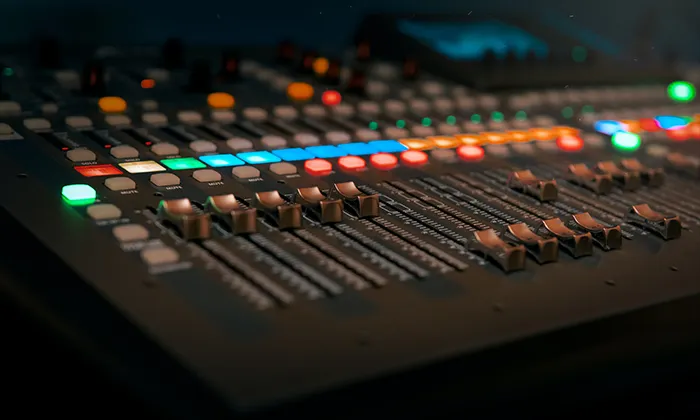
Choosing Between Headphones and Speakers
When it comes down to it, the choice between headphones or speakers depends on how you prefer to listen to music or other audio, and the overall experience you want. Both options have their pros and cons, so consider the following factors to determine which is right for you:
Sound Quality
Headphones are designed to deliver audio directly into your ears, so they can produce very high-quality, immersive sound, especially noise-canceling models. Speakers, on the other hand, have to fill an entire room with sound, so they may lack some of the depth and detail of headphones. That said, speakers have come a long way, and high-end options with multiple drivers can provide an expansive, crisp soundstage.
Portability
Headphones are extremely portable, easy to pack in a bag and use anywhere. Most are lightweight and wireless these days. Speakers are bulkier and meant to be used in a fixed location, so they offer little to no portability. If listening on the go is important, headphones are probably your best choice.
Do you like listening to music with others? If so, speakers are ideal for sharing the experience with family and friends in your living room or outdoor space. Headphones are designed for solo listening, so they won’t allow you to enjoy audio with other people.
Cost
In general, you’ll pay less for a decent pair of headphones versus a high-quality speaker system. However, prices for both categories vary widely based on the brand, specifications, and technology. You can find very affordable options for either one, or spend thousands on a premium audiophile setup.
At the end of the day, you need to weigh all these factors based on how and where you listen most. Don’t be afraid to combine the two—use speakers when you want to share the experience with others, and headphones when listening solo or on the go.
By considering the advantages of headphones in terms of accuracy and the immersive qualities of speakers, you can choose the option that best suits your preferences and desired listening experience.
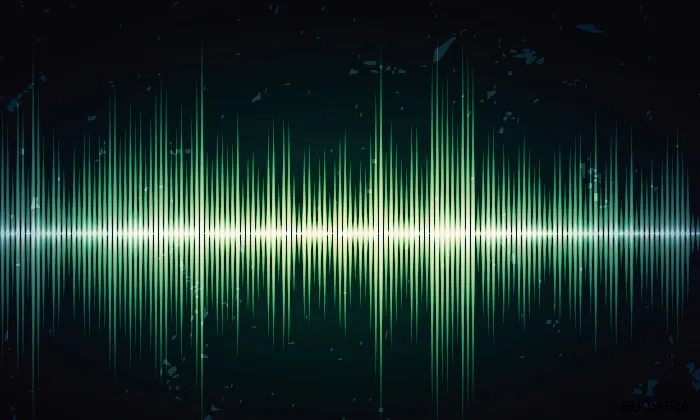
Differences in volume levels between headphones and speakers
When it comes to volume levels, there are significant differences between headphones and speakers that can impact hearing safety. Understanding these differences is crucial for maintaining healthy listening habits.
Headphone volume dangers
One common concern with headphones is the tendency for people to listen at higher volumes than they would with speakers.
Since headphones deliver sound directly into the ears without room cues, it’s easy to underestimate the intensity of the sound and inadvertently increase the volume to harmful levels.
Listening to loud music or prolonged exposure to high volumes through headphones can lead to permanent hearing damage.
It’s crucial to be aware of safe listening guidelines and ensure that you keep the volume at a reasonable level to protect your hearing.
Speaker volume considerations
While speakers have the advantage of room interaction and natural sound dispersion, it’s important to be mindful of the volume levels when using them.
High volumes from speakers can also cause hearing damage, especially when exposed to prolonged periods of loud sound. It’s recommended to maintain a moderate listening level and be aware of any signs of sound distortion, which may indicate that the volume is too high.
Taking regular breaks from loud sounds and using sound level meters or volume-limiting devices can help safeguard your hearing when using speakers.
Protecting your hearing
Regardless of whether you prefer headphones or speakers, prioritizing hearing safety is crucial. Here are some tips to protect your hearing while enjoying your audio experience:
Limit exposure to loud sound
Try to limit the duration and intensity of your listening sessions, whether through headphones or speakers. Taking regular breaks and giving your ears time to rest can help prevent long-term hearing damage.
Follow recommended volume guidelines
Familiarize yourself with safe listening recommendations. Many experts suggest using the 60/60 rule, which means listening at no more than 60% of the maximum volume for a maximum of 60 minutes per day.
Use noise-cancelling technology
Investing in headphones or speakers with active noise cancellation can help reduce the need to raise the volume to block out external noise. This can contribute to a safer listening experience by maintaining lower volume levels.
Be aware of warning signs
If you experience any symptoms like ringing in the ears (tinnitus), muffled hearing, or temporary hearing loss after listening to loud sound, it’s important to seek professional medical advice. These could be indications of noise-induced hearing damage.
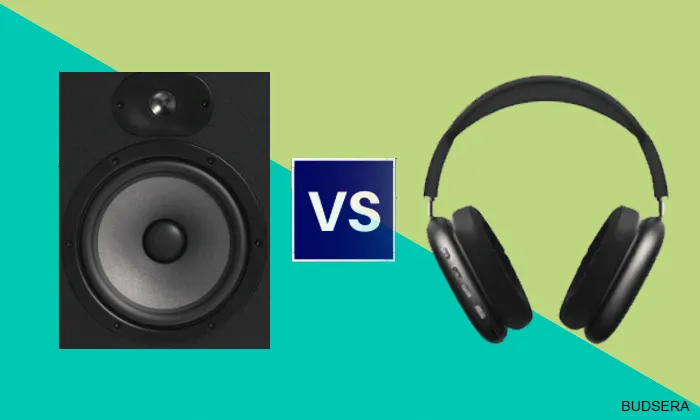
Final Thoughts
The choice between headphones and speakers depends on personal preferences and the specific context of use.
Headphones offer privacy, noise cancellation, and portability, but can be isolating and have limitations in range and comfort. Speakers provide an immersive and social listening experience, with tangible bass sensations, but are less portable and may have limitations in accuracy and sound quality.
Both options have seen advancements in recent years. It’s important to try both options and compare them to determine which suits individual preferences and needs. Ultimately, the goal is to enhance enjoyment and immerse oneself in the sounds that bring joy.
- Charging Bluetooth Headphones During Use: Is It Possible? - January 9, 2024
- Why Over-Ear Headphones Best for Hearing Health? (7 Reasons) - December 12, 2023
- Fixing the Bose Earbuds Not Charging in Case Problem: Solutions That Work - November 24, 2023
